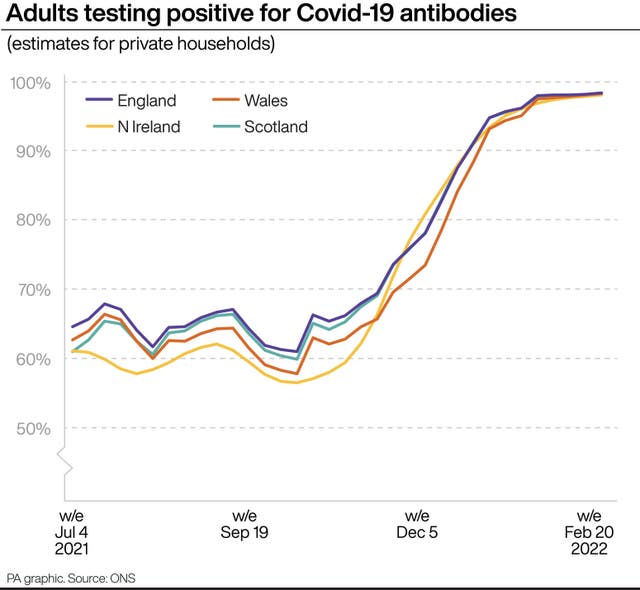Covid-19 antibodies at record levels among UK adults, research shows
The presence of the antibodies suggests someone has had the virus or has been vaccinated.

Covid-19 antibody levels among UK adults have reached a new record high, analysis suggests.
Some 98.4% of the adult population in England is now estimated to have antibodies, along with 98.3% in both Scotland and Wales and 98.1% in Northern Ireland.
The presence of coronavirus antibodies implies someone has had the infection in the past or has been vaccinated.
The latest figures, which have been calculated by the Office for National Statistics (ONS), are for the week ending February 20 and are the highest for all four UK nations since estimates began at the end of 2020.

They also show how antibody levels have jumped in recent months, reflecting the impact of the vaccine booster campaign that began in autumn 2021 but also the surge in coronavirus infections in December and January caused by the Omicron variant.
At the start of October 2021, just 61.0% of adults in England were likely to have Covid-19 antibodies, along with 59.9% in Scotland, 57.8% in Wales and 56.5% in Northern Ireland.
Levels among young children have also risen sharply.
About a third (33.0%) of eight to 11-year-olds in England were estimated to have antibodies at the start of December 2021 – the earliest figure available – but this now stands at 72.3%.
There has been a similarly steep rise in Scotland for this age group, from 31.9% to 71.3%, and even bigger jumps in Wales (from 26.6% to 72.7%) and Northern Ireland (14.8% to 78.8%).
Only a small number of children aged eight to 11 in the UK outside clinical trials have received any Covid-19 vaccine, meaning most people in this age group with antibodies will have them due to a coronavirus infection.
All five to 11-year-olds will be offered the vaccine later in the spring, the Government announced last month.
First doses of Covid-19 vaccine have been available for 12 to 15-year-olds in the UK since September last year, with jabs being offered in schools as well as at local vaccination centres.
More than nine in 10 children in this age group are now likely to have coronavirus antibodies, the ONS found.
Estimates range from 94.7% of those aged 12-15 in Scotland to 93.9% in England, with 94.4% in Northern Ireland and 94.0% in Wales.
All ONS estimates are based on a sample of blood test results from people in private households and are subject to uncertainty, given they are based on samples that are part of the wider population.
Antibody positivity is defined by having a fixed concentration of antibodies in the blood.
A negative test result occurs if there are no antibodies, or if antibody levels are too low to reach the threshold at the time of testing.
It takes between two and three weeks after infection – or vaccination – for the human body to make enough antibodies to fight coronavirus.
Levels are expected to decrease over time irrespective of vaccination or natural infection, especially when exposure to the virus is reduced, the ONS said.
This is because our bodies stop making antibodies when they are not needed.





